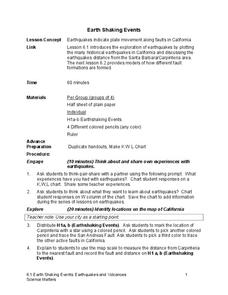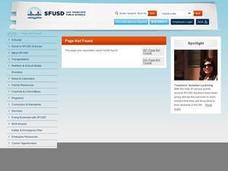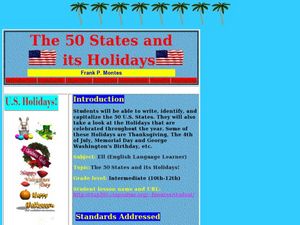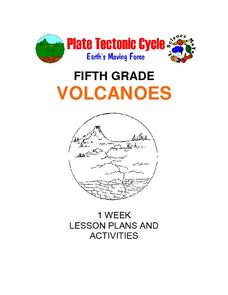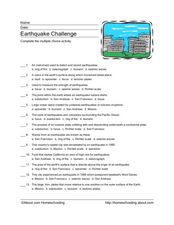Science Matters
Earthquakes and Volcanoes Post Assessment
The final lesson in the 20-part series is a post assessment covering earthquakes and volcanoes. Twenty-three questions incorporate each of the previous lessons through multiple choice, justified multiple choice, expanded multiple choice,...
Science Matters
Fault Formations
The San Andreas Fault moves about two inches a year, approximately the same rate fingernails grow—crazy! The third lesson in the series allows for hands-on exploration of various fault formations. Through the use of a Popsicle stick,...
EngageNY
TASC Transition Curriculum: Workshop 9
Here's a workshop for teachers that rocks the academic world! Using earthquakes as a medium for instruction, educators learn about crosscutting engineering with science. Fun, hands-on, collaborative exercises encourage participants to...
Science Matters
Earth Shaking Events
The world's largest measured earthquake happened in 1960 in Chile, reaching a terrifying 9.5 magnitude on the Richter Scale. The second lesson in the 20-part series introduces earthquakes and fault lines. Scholars map where previous...
Curated OER
Prehistoric Mesosaurus
Students draw conclusions why Mesosaurus has only been found in Africa and Brazil and how its fossil remains serve as important evidence that shows where two continents were once joined together.
Curated OER
Which Boundary Am I?
Sixth graders find 12 statements which describe the characteristics of the three boundary types, arranged in random order. Their task is to read each statement, and then CUT and PASTE it to the the appropriate boundary icon.
Curated OER
The 50 States and its Holidays
Though the format of this ELL lesson plan is confusing (the standards listed are for plate tectonics, yet the objectives are for American geography and holidays), a teacher could glean some ideas from the main idea. Here, pupils complete...
Curated OER
Earthquakes: Third Grade Lesson Plans and Activities
Introduce third graders to energy waves with a hands-on geology activity, in which they answer questions and compare seismograms in the San Francisco Bay area. After a demonstration that shows how bigger waves indicate a high-intensity...
NOAA
Into the Deep
Take young scientists into the depths of the world's ocean with the second activity of this three-part earth science series. After first drawing pictures representing how they imagine the bottom of the ocean to appear, students...
NOAA
Subduction Zones
Sink into an interactive learning experience about subduction zones! Junior oceanographers examine the earth-shaking and earth-making effects of subduction in the fourth installment in a 13-part series. Hands-on activities include...
Curated OER
Earthquake Science Project
Students simulate the Earth's plates moving like an earthquake by using newspaper and soil. In this earthquake lesson plan, students push and pull the newspaper together that has soil on top and observe what happens.
Curated OER
Our Ever Changing Earth
First graders discover plate tectonics. They observe the forces of erosion. They observe the forces of weathering. They state three ways the earth changes. They record observations and make conclusions about their observations.
Curated OER
Dead Sea Investigation: Middle East and African Connections
Learners demonstrate comprehension of the physical characteristics of the Dead Sea region and its connection to the Red Sea and the African Great Rift Valley. They are given students the opportunity to understand the role of plate...
Curated OER
Inside Earth
In this science worksheet, students find the words related to the study of earth plate movements and the answers are found at the bottom of the page.
Curated OER
Rock Cycle
In this rock cycle worksheet, students simulate the changes that occur during the rock cycle using a sugar cube. They use the sugar cube to represent a rock and perform changes on the sugar cube that represent the stages of the rock cycle.
Curated OER
A Model of Three Faults
Students investigate faults. In this science lesson, students explore the many stresses and strains in the earth's layers and research the types of faults in their state.
Curated OER
Earthquakes
Sixth graders explain that earthquakes are sudden motions along breaks in the crust called faults. They list the major geologic events including earthquakes, volcanic eruptions and mountain building, which are the result of crustal plate...
Curated OER
Geology with Peanut Butter and Jelly
Students will enjoy smashing the two tectonic sandwich plates together in faulting and compression fashions! They may even desire to capture their instructional destruction in a slideshow.
Curated OER
What about Continental Drift?
Fifth graders research the Continental Drift by researching for evidence of continental movement. The teaching explains the theory of plate tectonics and the Earth's magnetic field. They conclude the lesson by watching the video of "In...
Curated OER
Volcanoes: Fifth Grade Lesson Plans and Activities
Fifth graders explore volcanoes and the rocks they produce using the Internet. The lab portion of the lesson prompts young scientists to compare and describe igneous rocks. Next, they critique a pair or more of books on volcanoes in...
Curated OER
Earthquakes: Fifth Grade Lesson Plans and Activities
After learning about P waves and S waves, fifth graders view the intensity of earthquakes by examining seismographs and images of earthquake damage. Young scientists then forecasting future quakes by analyzing data about earthquakes...
Curated OER
Hazards: Fifth Grade Lesson Plans and Activities
After comparing earthquake and volcanic hazards to one another, fifth graders take a closer look at damage associated with a volcanic eruption. They then create a simulation of mudslides due to a volcanic eruption. Using different...
Curated OER
Earthquake Challenge
In this earthquake facts review or quiz worksheet, students read descriptive statements and choose the correct multiple choice answer. Students write 13 answers.
Curated OER
Plotting Earthquakes
Learners plot earthquakes on a map. In this lesson on earthquakes, students will explore recent earthquake activity in California and Nevada. Learners will plot fault lines and earthquake occurrences on a map.





